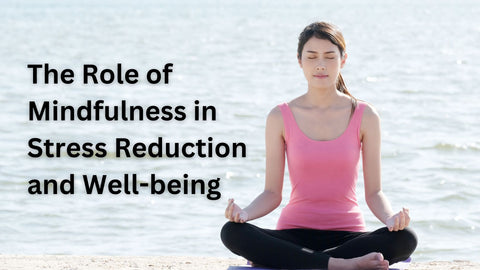In today's fast-paced and demanding world, stress has become a prevalent issue that affects our overall well-being. However, there is a powerful tool that can help us combat stress and cultivate a sense of inner peace and well-being: mindfulness. Mindfulness, rooted in ancient contemplative practices, has gained significant attention in recent years for its ability to reduce stress and promote overall mental and emotional well-being. In this article, we explore the role of mindfulness in stress reduction and how it can positively impact our lives.
Cultivating Present-Moment Awareness
Mindfulness is the practice of intentionally directing our attention to the present moment without judgment. It involves bringing our awareness to our thoughts, emotions, bodily sensations, and the surrounding environment. By engaging in mindfulness, we develop a deeper understanding of our inner experiences and the world around us.
Rewiring the Brain for Resilience
Scientific research has revealed that mindfulness practice can lead to structural and functional changes in the brain. Studies using neuroimaging techniques have shown that consistent mindfulness practice increases the thickness of the prefrontal cortex, the part of the brain associated with emotional regulation and decision-making. Additionally, mindfulness has been found to reduce activity in the amygdala, the brain region responsible for the "fight-or-flight" response. These changes in the brain contribute to enhanced emotional resilience and stress reduction.
Techniques and Practices
There are various ways to cultivate mindfulness in our daily lives. Meditation is a popular practice that involves focusing our attention on a specific object, such as the breath or a mantra. By consistently dedicating time to meditation, we train our minds to become more present and develop a greater capacity for mindfulness in everyday situations. Other mindfulness techniques include mindful breathing, body scan exercises, and mindful walking, all of which can be incorporated into our daily routines.
Calming the Mind and Body
One of the primary benefits of mindfulness practice is its ability to reduce stress. By bringing our attention to the present moment, we become aware of our stress triggers and learn to respond to them with greater clarity and equanimity. Mindfulness helps us develop a non-reactive stance towards stressors, allowing us to navigate challenges with a greater sense of calm and resilience. Regular mindfulness practice also promotes relaxation, lowers blood pressure, and reduces the production of stress hormones, leading to an overall sense of well-being.
Cultivating Compassion and Self-acceptance
Mindfulness practice not only helps us manage stress but also enhances our emotional well-being. By cultivating present-moment awareness, we develop the ability to observe our thoughts and emotions without judgment. This non-judgmental awareness allows us to respond to our experiences with self-compassion and self-acceptance. Mindfulness helps us recognize and break free from negative thought patterns and cultivate a greater sense of happiness, gratitude, and contentment.
Mindfulness is a powerful practice that can profoundly impact our well-being by reducing stress and enhancing our overall mental and emotional resilience. By incorporating mindfulness techniques into our daily routines, we can experience the transformative benefits of mindfulness and lead more fulfilling and balanced lives. Embracing mindfulness is a way of allowing us to live fully in the present moment and nurture our well-being. You can certainly learn in depth about mindfulness in the book The Power of Your Mind. Reading this book will guide you to a stress-free life and also help you understand the potential of your brain. The book is a complete guide to reaching the full potential of your mind. Grab the book now.




Comments (0)
There are no comments for this article. Be the first one to leave a message!